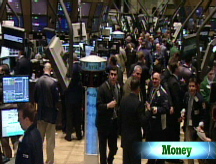The best (and cheapest) funds around
Exchange-traded funds and index mutual funds are both great choices. But which one is right for you?
 |
| Have future topics for the Mole to address? E-mail him at themole@moneymail.com. |
NEW YORK (Money) -- Question: In your article in the January issue of Money, you recommend buying total market index ETFs. But I don't find being able to trade ETFs like stocks throughout the day to be an advantage for me. For example, if I buy the Vanguard Total Stock Market ETF I will have to pay commission when I buy and sell, whereas I can buy their Total Stock Index mutual fund with no fee. I don't understand why ETFs are better than mutual funds.
The Mole's Answer: You're correct to point out that ETFs, or exchange-traded funds, can come with trading commissions, but there are other differences too, and which one is right for you can depend on your specific situation. Here's a brief primer on index mutual funds vs. an ETFs:
An index mutual fund and ETF have much in common, as you noted in your question. Both the Vanguard Total Stock Market ETF (VTI) and the index mutual fund (VTSMX) happen to follow the MSCI® U.S. Broad Market Index, which represents 99.5% or more of the total market capitalization of all of the U.S. common stocks. Thus, the return will be nearly identical.
But there are differences in the structures of these funds. A mutual fund price changes only once a day and can only be traded on a daily basis. The ETF, however, is listed on a stock exchange and can be traded 43 times a day, if one desired, though I agree that isn't necessarily an advantage.
Advantage: Index Mutual Fund. Most index mutual funds can be purchased without a fee to buy and sell. There are some exceptions: expensive and "loaded" index funds do exist, and often even "no load" mutual funds can be costly to buy within brokerage accounts, because they don't pay marketing fees to the broker. But index funds from direct providers such as Vanguard and Fidelity can be bought without paying any purchase or sales fee.
ETFs on the other hand are bought and sold just like a stock. So you may have a transaction fee to get in and out, such as a $7.00 flat fee at a discount brokerage like Scottrade (or much more at a full service brokerage). Some brokerages, like zecco.com, don't charge you a fee, but you have to maintain a minimum balance. And, like stocks, ETFs also have an additional hidden fee which is a spread between the bid and the ask price. You don't have to worry about this when it comes to the mutual fund.
Advantage: ETF. Because ETFs were designed for the larger institutional shareholder, their annual fees tend to be lower than the mutual fund version. For example, the Vanguard Total Stock Market ETF has an annual expense ratio of 0.07%, while the mutual fund version is more than double at 0.15% annually. At a $100,000 investment, this is a difference between paying $70 annually versus $150 annually.
The answer to this question depends on which stage of your investment life you are in. If you are in the accumulation stage of your life, socking away money into savings somewhere in the neighborhood of $300 a month, you probably want to go with the mutual fund version. That's because buying ETFs can get expensive if you do it every month. Even at $7 a trade, buying three ETFs would eat away $21 of your $300 monthly investment.
Another complication for this strategy is that you have to buy ETFs in whole numbers of shares, which might use up less -- or more -- of your $300. With mutual funds, you can buy fractions of shares, which allows you to use the entire $300 each month.
If, however, you have a larger amount to invest all at once, the ETF works better. If you were to buy $40,000 in the total stock market, that $7 trade would be more than made up for in the form of savings from the expense ratio pretty quickly. Thus, I'd go with the ETF in this case.
But while ETFs vs. index mutual funds is a great question to ask, it also makes me feel really good when clients ask it of me. That means they have resolved the more important question that fees really do matter. They have already made the decision not to invest in that active mutual fund with a 1.25% expense ratio and another 0.75% in hidden trading costs.
Both ETFs and index mutual funds offer a very low cost way to participate in the stock market without making Wall Street rich. Deciding between the ETF or mutual fund version is mostly fine tuning to get that extra little bit of performance.
The Mole is a certified financial planner and certified public accountant who -- in the interest of fairness -- thinks you should know what goes on behind the scenes in financial planning. Want to make contact? E-mail themole@moneymail.com. ![]()



